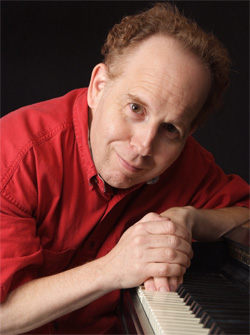by Mike Telin

Performing chamber music has and continues to be an important part of Shapiro’s musical life. He has performed regularly with members of the Los Angeles Philharmonic, the Chicago Symphony and Cleveland Orchestras, and has also performed with the Cavani, Mirò and Linden Quartets. And he has very kind things to say about his colleagues for Sunday’s concert, all of whom are students at the Cleveland Institute of Music. “I don’t think of them as students, we are equal colleagues — we share ideas and talk about what we think would make things better.”
Shapiro has served on the faculty at CIM for sixteen years, which he says is hard to believe and he sums up his love for teaching this way “Leonard Bernstein said that teaching is learning and learning is teaching. There’s something about the process of clarifying and imparting to the student that somehow makes one understand the music better. That’s part of the love of it — and also getting to work with very special people.”
Throughout his career Shapiro has been a leading interpreter of the music of Schubert, Mozart, Schumann, Brahms, and Beethoven—whose thirty-two sonata cycle he has performed twice. “I have always felt close to the so-called central European composers and of course there’s no end of the depth that can be reached, so their music has always been a continuous source of inspiration to me.”
In addition to Shapiro’s many recitals and concerto appearances around the globe, he has an active career as a recording artist which includes a CD of Beethoven’s “Diabelli” Variations on the Azica label. He has also released three DVDs as part of his Shapiro Performs Schubertproject which comprise nearly all the Schubert piano sonatas and include commentary on Schubert’s music, suggestions for interpretation, and remarks on each sonata. “The project started a few years back at the suggestion of a friend of mine and it became quite complicated. It took a lot of time and work to put the commentary together and we needed to record all of the musical examples.” The recordings were made by videographer and Cleveland Orchestra violinist Mark Dumm in Harkness Chapel.
Although Shapiro did his own research and wrote the script he says “it’s not like I all of a sudden went into the library and spent hours researching. It’s just that over the years I have accumulated bits of information by reading this or that book or article, so it was all filed away in my brain. So it was more like that.” And why this project? He laughs. “Why not — and after all there are some really great sonatas that people don’t hear very often that are full of miraculously beautiful music.”
Shapiro points out that although there are lots of recordings of the Schubert sonatas by various artists, there are almost no DVD’s. “And one selling point is that you actually get to watch something and you have the commentary. I do think that commentary creates a bond between the performer and the audience. Just to hear the voice and see that the people performing are real people and not just music making machines.” However he does feel that many times what the audience hears or reads is analysis that doesn’t help at all. “First there is this section then we go to that section — then there is this theme and that theme. The audience can hear that, so the performer has to somehow bring an artistic conceptual awareness of the music to the audience, which is a bit harder to do.”
When not playing the piano, Daniel Shapiro can often be found competing in Scrabble tournaments. “I’ve been playing scrabble most of my life but when I moved to Cleveland I suddenly got into going to clubs and tournaments. I’ve wasted countless hours and chunks of brain space memorizing lists of words, but it’s a very fun escape from music.”
Shapiro does think he has learned a lot of words that are totally useless in his everyday life, “but, they are useful when playing Scrabble.” I ask him to name one and without missing a beat he responds, “I don’t think I‘d ever have much use for the word vug. You can also spell it vugg or vugh – it is a hole or cavity in rock.”
How many champion Scrabble players are in Cleveland? “there’s a club in Rocky River that I go to and the guy who runs it is a friend of mine who’s one of the top players in the State.” The National Scrabble Association issues ratings or rankings much like the National Chess Federation — the higher the rating the higher your standing in the Scrabble world. Shapiro says that he’s rated in the upper 1300’s “It makes me look fabulous compared to the average kitchen table player but, in the world of Scrabble playing I’m thoroughly mediocre. I have a friend rated in the 1700 to 1800 range and the top players are rated 1900 to 2000.” For anyone interested in reading about the world of Scrabble tournaments Daniel Shapiro recommends the book Word Freak that chronicles the whole Scrabble scene.
Published on ClevelandClassical.com November 12, 2013
Click here for a printable version of this article.



